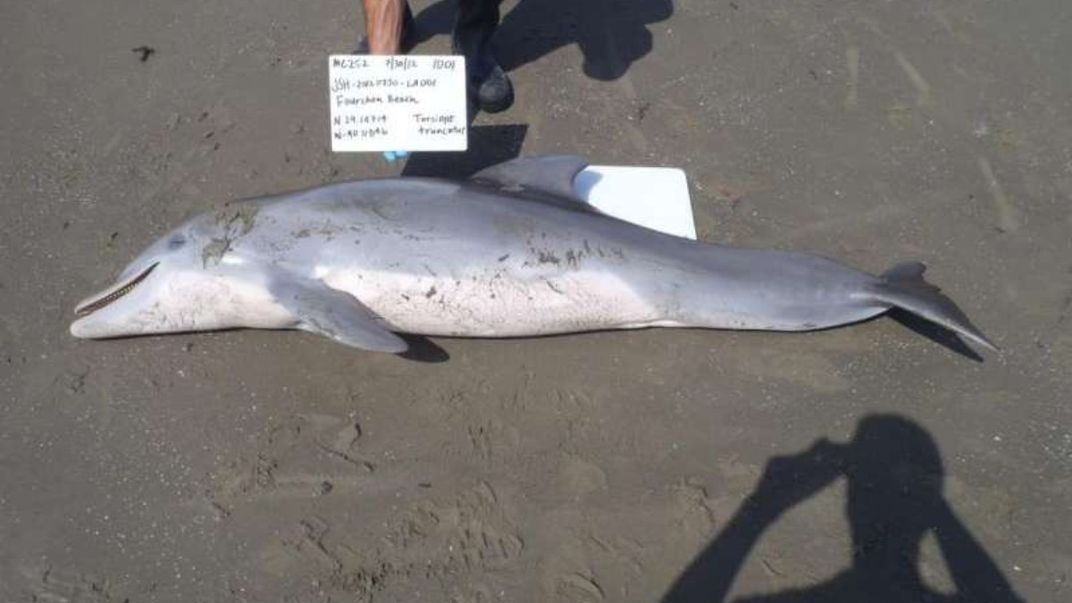Research Confirms Fears that Deepwater Horizon Spill Contributed to Dolphin Deaths
Dead bottlenose dolphins stranded in the Gulf of Mexico had lesions linked to petroleum exposure
/https://tf-cmsv2-smithsonianmag-media.s3.amazonaws.com/filer/e9/25/e9258db6-210d-4b6b-a646-7777906124e2/edit_dolphins_swim_thru_oil_at_height_of_deepwater_horizon_oil_spill_noaa_photo.jpg)
In 2010, bottlenose dolphins (Tursiops truncatus) started washing up on the shores of Mississippi, Louisiana and Alabama. Many were already dead, and some died soon after. This mysterious die-off continued through 2014, reaching numbers never before seen in the Gulf of Mexico.
This week researchers confirmed suspicions that oil from the 2010 BP Spill had contributed to these dolphin deaths. Examining stranded dolphins over the course of two years, the team found lesions linked to petroleum exposure. "No feasible alternatives remain," NOAA's Stephanie Venn-Waston said in a press conference Wednesday.
Occasional cases of dolphins washing ashore and getting stranded are normal. Usually this happens with sick or injured animals. But, the Gulf coast has seen a huge spike in dolphin strandings — 1300 since 2010 — and over 90 percent of the animals have died.

From June 2010 to December 2012, NOAA researchers collected tissue samples from deceased dolphins in the Gulf. A bit of forensic invetigating revealed that the animals had lesions on their adrendal glands and lungs. Exposure to petroleum compounds causes these types of lesions, and the researchers posit that the petroleum that caused these lesions came from the Deepwater Horizon rig explosion. The dolphins likely inhaled fumes from the surface.
One in five of the dolphins examined had lung lesions caused by bacteria pneumonia. "These dolphins had some of the most severe lung lesions I have seen in the over 13 years that I have been examining dead dolphin tissues from throughout the United States,” Kathleen Colegrove, a researcher at the University of Illinois and the study’s lead veterinary pathologist, said in the press release.
The findings, published May 20 in the journal PLOS ONE, back up a 2011 health assessment of bottlenose dolphins living in Barataria Bay in Louisiana that showed high rates of lung diseases, adrenal problems and general bad health. During the 2010 oil washed into the bay, and the area saw a significan dolphin die-off in 2010 and 2011.
BP spokesperson Geoff Morrell released a statement to several news outlets (Nature, Newsweek, PBS News Hour, among others) denying any connection between the dolphin deaths and their Macondo Well spill: "The data we have seen thus far, including the new study from NOAA, do not show that oil from the Deepwater Horizon accident caused an increase in dolphin mortality."
If, as the research suggests, dolphins did die from the effects of the spill, it's still not clear what additional effects of the spill will ooze to the surface for dolphins in the long term.
/https://tf-cmsv2-smithsonianmag-media.s3.amazonaws.com/accounts/headshot/Screen_Shot_2014-01-27_at_12.05.16_PM.png)
/https://tf-cmsv2-smithsonianmag-media.s3.amazonaws.com/accounts/headshot/Screen_Shot_2014-01-27_at_12.05.16_PM.png)